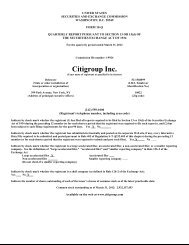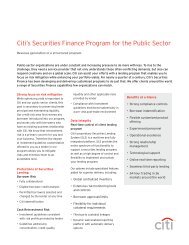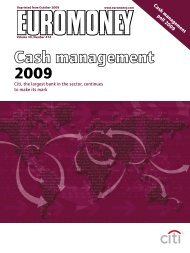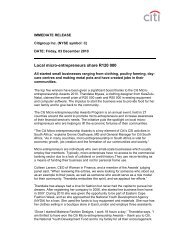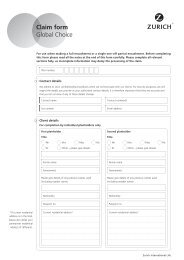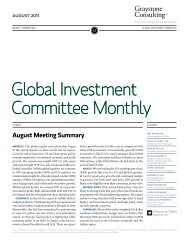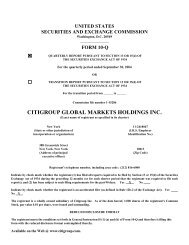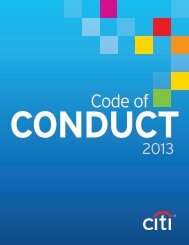Citigroup Inc.
Citigroup Inc.
Citigroup Inc.
Create successful ePaper yourself
Turn your PDF publications into a flip-book with our unique Google optimized e-Paper software.
SUPERVISION AND REGULATION<strong>Citigroup</strong> is subject to regulation under U.S. federal and state laws, as well asapplicable laws in the other jurisdictions in which it does business.GeneralAs a registered bank holding company and financial holding company,<strong>Citigroup</strong> is regulated and supervised by the Board of Governors of theFederal Reserve System (FRB). <strong>Citigroup</strong>’s nationally chartered subsidiarybanks, including Citibank, N.A., are regulated and supervised by the Officeof the Comptroller of the Currency (OCC), its federal savings associations bythe Office of Thrift Supervision, and its state-chartered depository institutionsby state banking departments and the Federal Deposit Insurance Corporation(FDIC). The FDIC also has back-up enforcement authority for bankingsubsidiaries whose deposits it insures. Overseas branches of Citibank areregulated and supervised by the FRB and OCC and overseas subsidiary banksby the FRB. Such overseas branches and subsidiary banks are also regulatedand supervised by regulatory authorities in the host countries.A U.S. financial holding company and the companies under its controlare permitted to engage in a broader range of activities in the U.S. andabroad than permitted for bank holding companies and their subsidiaries.Unless otherwise limited by the FRB, financial holding companies generallycan engage, directly or indirectly in the U.S. and abroad, in financialactivities, either de novo or by acquisition, by providing after-the-fact noticeto the FRB. These financial activities include underwriting and dealing insecurities, insurance underwriting and brokerage, and making investmentsin non-financial companies for a limited period of time, as long as Citidoes not manage the non-financial company’s day-to-day activities, andits banking subsidiaries engage only in permitted cross-marketing with thenon-financial company. If <strong>Citigroup</strong> ceases to qualify as a financial holdingcompany, it could be barred from new financial activities or acquisitions,and have to discontinue the broader range of activities permitted to financialholding companies.Citi is permitted to acquire U.S. depository institutions, including out-ofstatebanks, subject to certain restrictions and the prior approval of federalbanking regulators. In addition, intrastate bank mergers are permittedand banks in states that do not prohibit out-of-state mergers may merge. Anational or state bank can also establish a new branch in another state ifpermitted by the other state, and a federal savings association can generallyopen new branches in any state. However, all bank holding companies,including <strong>Citigroup</strong>, must obtain the prior approval of the FRB beforeacquiring more than 5% of any class of voting stock of a U.S. depositoryinstitution or bank holding company. The FRB must also approve certainadditional capital contributions to an existing non-U.S. investment andcertain acquisitions by <strong>Citigroup</strong> of an interest in a non-U.S. company,including in a foreign bank, as well as the establishment by Citibank offoreign branches in certain circumstances.For more information on U.S. and foreign regulation affecting <strong>Citigroup</strong>and its subsidiaries, see “Risk Factors” above.Changes in RegulationProposals to change the laws and regulations affecting the banking andfinancial services industries are frequently introduced in Congress, beforeregulatory bodies and abroad that may affect the operating environment of<strong>Citigroup</strong> and its subsidiaries in substantial and unpredictable ways. Thishas been particularly true as a result of the recent financial crisis. <strong>Citigroup</strong>cannot determine whether any such proposals will be enacted and, if enacted,the ultimate effect that any such potential legislation or implementingregulations would have upon the financial condition or results of operationsof <strong>Citigroup</strong> or its subsidiaries. For additional information regardingrecently enacted and proposed legislative and regulatory initiatives, see“Management’s Discussion and Analysis of Financial Condition and Resultsof Operations – Executive Summary – 2011 Business Outlook,” “CapitalResources and Liquidity” and “Risk Factors” above.Other Bank and Bank Holding Company Regulation<strong>Citigroup</strong> and its banking subsidiaries are subject to other regulatorylimitations, including requirements for banks to maintain reservesagainst deposits, requirements as to risk-based capital and leverage (see“Capital Resources and Liquidity” above and Note 20 to the ConsolidatedFinancial Statements), restrictions on the types and amounts of loans thatmay be made and the interest that may be charged, and limitations oninvestments that can be made and services that can be offered. The FRBmay also expect <strong>Citigroup</strong> to commit resources to its subsidiary banks incertain circumstances. <strong>Citigroup</strong> is also subject to anti-money launderingand financial transparency laws, including standards for verifying clientidentification at account opening and obligations to monitor clienttransactions and report suspicious activities.Securities and Commodities Regulation<strong>Citigroup</strong> conducts securities underwriting, brokerage and dealing activitiesin the U.S. through <strong>Citigroup</strong> Global Markets <strong>Inc</strong>., its primary broker-dealer,and other broker-dealer subsidiaries, which are subject to regulations of theSEC, the Financial Industry Regulatory Authority and certain exchanges,among others. <strong>Citigroup</strong> conducts similar securities activities outsidethe U.S., subject to local requirements, through various subsidiaries andaffiliates, principally <strong>Citigroup</strong> Global Markets Limited in London, which isregulated principally by the U.K. Financial Services Authority, and <strong>Citigroup</strong>Global Markets Japan <strong>Inc</strong>. in Tokyo, which is regulated principally by theFinancial Services Agency of Japan.<strong>Citigroup</strong> also has subsidiaries that are members of futures exchanges andare registered accordingly. In the U.S., CGMI is a member of the principalU.S. futures exchanges, and <strong>Citigroup</strong> has subsidiaries that are registeredas futures commission merchants and commodity pool operators with theCommodity Futures Trading Commission (CTFC).CGMI is also subject to Rule 15c3-1 of the SEC and Rule 1.17 of the CTFC,which specify uniform minimum net capital requirements. Compliance withthese rules could limit those operations of CGMI that require the intensiveuse of capital, such as underwriting and trading activities and the financingof customer account balances, and also limits the ability of broker-dealers totransfer large amounts of capital to parent companies and other affiliates.See also “Capital Resources—Broker-Dealer Subsidiaries” and Note 20 tothe Consolidated Financial Statements for a further discussion of capitalconsiderations of <strong>Citigroup</strong>’s non-banking subsidiaries.Dividends<strong>Citigroup</strong> is currently subject to restrictions on its ability to pay commonstock dividends. See “Risk Factors” above. For information on the abilityof <strong>Citigroup</strong>’s subsidiary depository institutions and non-bank subsidiariesto pay dividends, see “Capital Resources—Capital Resources of <strong>Citigroup</strong>’sDepository Institutions” and Note 20 to the Consolidated FinancialStatements above.301



